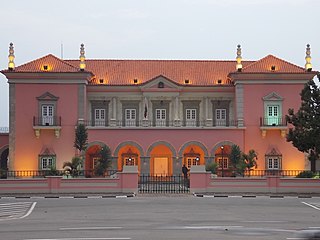Related Research Articles

Huambo, formerly Nova Lisboa, is the third-most populous city in Angola, after the capital city Luanda and Lubango, with a population of 595,304 in the city and a population of 713,134 in the municipality of Huambo. The city is the capital of the province of Huambo and is located about 220 km E from Benguela and 600 km SE from Luanda. Huambo is a main hub on the Caminho de Ferro de Benguela (CFB), which runs from the port of Lobito to the Democratic Republic of the Congo's southernmost province, Katanga. Huambo is served by the Albano Machado Airport.
The Angolan football Cup is the main "knockout" cup competition in Angolan football.

Girabola, or Campeonato Nacional de Futebol em Séniores Masculinos, is the top division of Angolan football. It is organized by the Angolan Football Federation.

Atlético Petróleos do Huambo or simply Petro do Huambo is an Angolan football club based in Huambo. The club was established in 1980 as a result of a merger between Atlético de Nova Lisboa and Desportivo Sonangol. They are currently playing their home games at the Estádio Mártires da Canhala.
The Baptist Convention of Angola is a Baptist Christian denomination in Angola. It is affiliated with the Baptist World Alliance. The headquarters is in Luanda.

Televisão Pública de Angola E.P. or TPA is the national broadcaster of the Southern African state of Angola. It also operates an international channel TPAi. TPA is headquartered in the capital city Luanda and broadcasts in the Portuguese language. The international channel broadcasts selected shows targeted at foreign audiences and the Angolan community abroad.
The Angolan Men's Basketball League, is the top tier men’s basketball league in Angola. Formerly known as BAI Basket, BIC Basket, and now Unitel Basket, named after its major sponsors, formerly Banco Africano de Investimentos, Banco de Investimento e Crédito and now Unitel, the competition is organized by the Angolan Basketball Federation.
The Angolan Basketball Cup is an annual basketball competition in which all Angolan basketball clubs are eligible to contest. The tournament, played in a knock-out system, is Angola's second most important basketball competition following the national league.
Sport Huambo e Benfica, originally Sport Nova Lisboa e Benfica or Benfica de Nova Lisboa, later renamed as Sport Huambo e Benfica or Benfica do Huambo or Mambroa, is a football club from Huambo, Angola. The club was established as the then Nova Lisboa affiliate of S.L. Benfica of Portugal, and shares the same colours. The logo is also very similar to the Portuguese one.
The 2016 Taça de Angola was the 35th edition of the Taça de Angola, the second most important and the top knock-out football club competition following the Girabola.

Maria Cremilda Martins Fernandes Alves de Lima is an Angolan children's book author.
The 2011 Taça de Angola was the 30th edition of the Taça de Angola, the second most important and the top knock-out football club competition in Angola, following the Girabola. G.D. Interclube beat C.D. Primeiro de Agosto 5–3 in a penalty shoot-out after a 1–1 draw in regular time, to secure its third title.
The 2009 Taça de Angola was the 28th edition of the Taça de Angola, the second most important and the top knock-out football club competition in Angola, following the Girabola. Primeiro de Agosto beat Sagrada Esperança 2–1 in the final, to secure its 3rd title.
Maria de Fátima - better known by her pen name Cho do Guri - was an Angolan poet and writer.
The 2008 Taça de Angola was the 27th edition of the Taça de Angola, the second most important and the top knock-out football club competition in Angola, following the Girabola. Santos Futebol Clube de Angola beat Recreativo do Libolo 1–0 in the final, to secure its 1st title.
The 2007 Taça de Angola was the 26th edition of the Taça de Angola, the second most important and the top knock-out football club competition following the Girabola.
The 2004 Taça de Angola was the 23rd edition of the Taça de Angola, the second most important and the top knock-out football club competition following the Girabola. Sonangol do Namibe beat Primeiro de Agosto 2-0 in the final to secure its second title.
The 2003 Taça de Angola was the 22nd edition of the Taça de Angola, the second most important and the top knock-out football club competition following the Girabola. Interclube beat Sagrada Esperança 1-0 in the final to secure its second title.
Maria Celestina Fernandes is an Angolan children's author. She has also written poetry and short stories, and had earlier careers as a social worker and lawyer. She has won several awards including Prémio Literário Jardim do Livro Infantil, Prémio Caxinde do Conto Infantil, and Prémio Excelência Literária.
Angolan Futsal Championship is the premier futsal league in Angola. The competition is run by the Campeonato Nacional de futebol salão under the hospices of the Federação Angolana de Futebol de Salão (FAFUSA).
References
- 1 2 3 "Gabriela Antunes". Portal da Literatura. Retrieved 25 October 2016.
- 1 2 James, Martin W. (27 May 2004). Historical Dictionary of Angola . Scarecrow Press. p. 8. ISBN 978-0-8108-6560-0.
- 1 2 ANGOP (8 April 2004). "Gabriela Antunes foi a enterrar esta tarde no Alto das Cruzes". AngoNotícias. Archived from the original on 4 October 2016. Retrieved 25 October 2016.
- 1 2 Cardoso, Pedro (7 April 2004). "Morte de Gabriela Antunes deixa um vazio na literatura infantil angolana". ANGOP . Archived from the original on 4 October 2016. Retrieved 26 October 2016.
- 1 2 "Escritora Gabriela Antunes morre vítima de doença". Nexus. 5 April 2004. Archived from the original on 4 October 2016. Retrieved 26 October 2016.
- ↑ Macêdo, Tania; Chaves, Rita de Cássia Natal; Flory, Suely Fadul Villibor (2007). Literaturas de língua portuguesa: Angola (in Portuguese). Arte & Ciência. p. 157. ISBN 978-85-7473-339-5.
- ↑ "WOMEN WRITING AFRICA: A Bibliography of Lusophone Women Writers". European Languages and Studies, The University of Western Australia. Retrieved 19 October 2014.